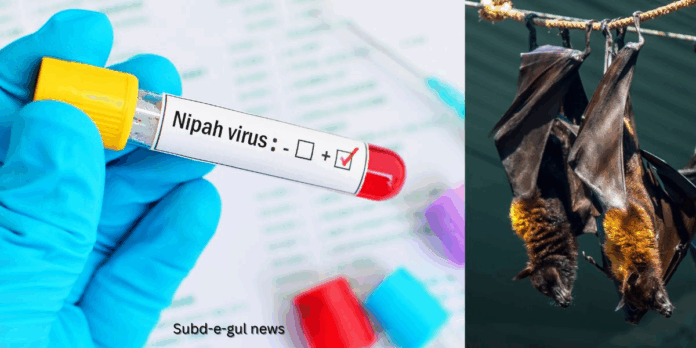The Nipah contagion has formerly again made captions in India, with two verified cases lately reported in the state of Kerala. As authorities scramble to contain the spread of the contagion, three sections are now on high alert. This blog post aims to give a comprehensive overview of the situation, the symptoms, transmission, forestallment, and the current state of affairs in the affected regions.Stay informed and set as we address the pivotal questions girding this public health concern.
What’s the Nipah Virus?
The Nipah contagion( NiV) is a zoonotic contagion that can be transmitted from creatures to humans. It was first linked in Malaysia in 1998, but it has ago caused outbreaks in several countries, including India. The contagion is primarily carried by fruit batons, which are the natural hosts of NiV. Humans can contract the contagion through direct contact with infected creatures, similar as batons or gormandizers, or by consuming defiled food like raw date win tire. Nipah contagion outbreaks frequently lead to severe illness in humans, causing symptoms ranging from fever and headaches to more serious conditions like encephalitis( brain inflammation). The complaint can be fatal in some cases.
Two Nipah Contagion Cases Detected in India What We Know So Far
In July 2025, two individuals in the state of Kerala were verified to be infected with the Nipah contagion. Both cases were detected in the Kozhikode quarter, which has been the center of former outbreaks in India. Health authorities fleetly linked and insulated the cases, following strict protocols to help spread. As of now, there are no verified reports of the contagion spreading beyond these two cases, but authorities have placed three sections — Kozhikode, Malappuram, and Wayanad — on high alert. Affected areas are being nearly covered, and mass mindfulness juggernauts have been launched to educate residents on preventative measures.
How Does Nipah Virus Spread?
The Nipah contagion is primarily transmitted through
Direct contact with infected creatures Fruit batons, which are the primary carriers of the contagion, can spread through their slaves, urine, or feces. In some cases, gormandizers have also been linked as a secondary host, contributing to mortal infections.
Consumption of defiled food Infected fruit batons may pollute raw date win tire or other fruits, which can also be consumed by humans.
mortal- to- mortal transmission Although rare, the contagion can spread through close contact with infected individuals or their fleshly fluids, similar as slaver, urine, and blood.
The contagion generally enters the mortal body through the respiratory system or mucous membranes.
Symptoms of Nipah Virus Infection
Symptoms generally appear 4 to 14 days after exposure to the contagion. original signs include
- Fever
- Headache
- Muscle pain
- Dizziness
- Nausea and puking
In severe cases, the contagion can lead to encephalitis( lump of the brain), causing confusion, seizures, and indeed coma. The complaint has a high mortality rate, especially when left undressed. Timely medical intervention can ameliorate the chances of survival.
Current Status Three sections on High Alert
The state government, along with health officers, has taken immediate action to control the outbreak.
- Contact tracing Authorities have initiated the identification and counter blockade of individualities who have had close contact with the two
- verified cases. Specific areas in Kozhikode, Malappuram, and Wayanad sections have been declared constraint zones to limit the contagion’s spread.
- Public health mindfulness mindfulness juggernauts have been launched, prompting the public to avoid consuming raw date win tire or fruits that may be defiled by batons. Public health guidelines are being distributed to educate citizens about particular hygiene and infection control.
- Sanitarium preparedness Health installations in the affected regions are being equipped with the necessary coffers to handle possible cases. Special insulation wards have been set up in hospitals to manage implicit cases safely.
Preventative Measures for Nipah Virus
Given the threat of transmission, it’s essential for the public to take certain precautions.
- Avoid consumption of raw date win tire or fruits that may have been defiled by fruit batons.
- Exercise good hygiene by regularly washing hands with cleaner and water, especially after visiting public places or handling potentially defiled food.
- Wear defensive outfit similar as gloves and masks if in direct contact with infected creatures or sick individualities.
- Avoid close contact with people showing symptoms of the complaint, especially those who have lately traveled from affected areas.
- insulate cases who are showing symptoms of the contagion and seek medical attention incontinently.
Is There a Cure or Vaccine for Nipah Virus?
presently, there’s no specific antiviral treatment for Nipah contagion infection. Treatment substantially focuses on probative care, similar as maintaining hydration, managing symptoms, and furnishing respiratory support when necessary. In some cases, specifics may be used to reduce brain inflammation. A vaccine for the Nipah contagion is still in development, but it has not yet been made available for public use. Experimenters continue to work towards creating an effective vaccine that could help unborn outbreaks.
Constantly Asked Questions( FAQs)
Q.1 What’s the mortality rate of the Nipah contagion?
A1 The mortality rate for the Nipah contagion is high, ranging from 40 to 75 depending on the outbreak and the quality of medical care available.
Q.2 Can humans spread the Nipah contagion to others?
A2 Yes, while mortal- to- mortal transmission is rare, it’s possible through direct contact with fleshly fluids like slaver, blood, or urine.
Q.3 What should I do if I suppose I’ve been exposed to the Nipah contagion?
A3 If you believe you have been in close contact with a verified case or have consumed polluted food, seek immediate medical attention. Early opinion and treatment are pivotal to perfecting the chances of recovery.
Q.4 Are there any trip restrictions in the affected areas?
A4 As of now, there are no formal trip restrictions, but trippers are advised to stay informed about the situation and avoid areas with verified cases.
Q.5 How can I cover my family from the Nipah contagion?
A5 To cover your family, avoid contact with sick creatures, wash hands constantly, and educate children about the significance of hygiene and avoiding potentially defiled food.
Conclusion
As the two verified cases of Nipah contagion in Kerala have put three sections on high alert, it’s essential for residents and trippers alike to stay informed and take necessary preventives to help the spread of this deadly contagion. While authorities work to contain the outbreak, individualities can play a pivotal part in reducing the threat by following health guidelines and being watchful in their diurnal conditioning. Stay safe, stay informed, and take the necessary way to cover yourself and your loved bone from the Nipah contagion.



